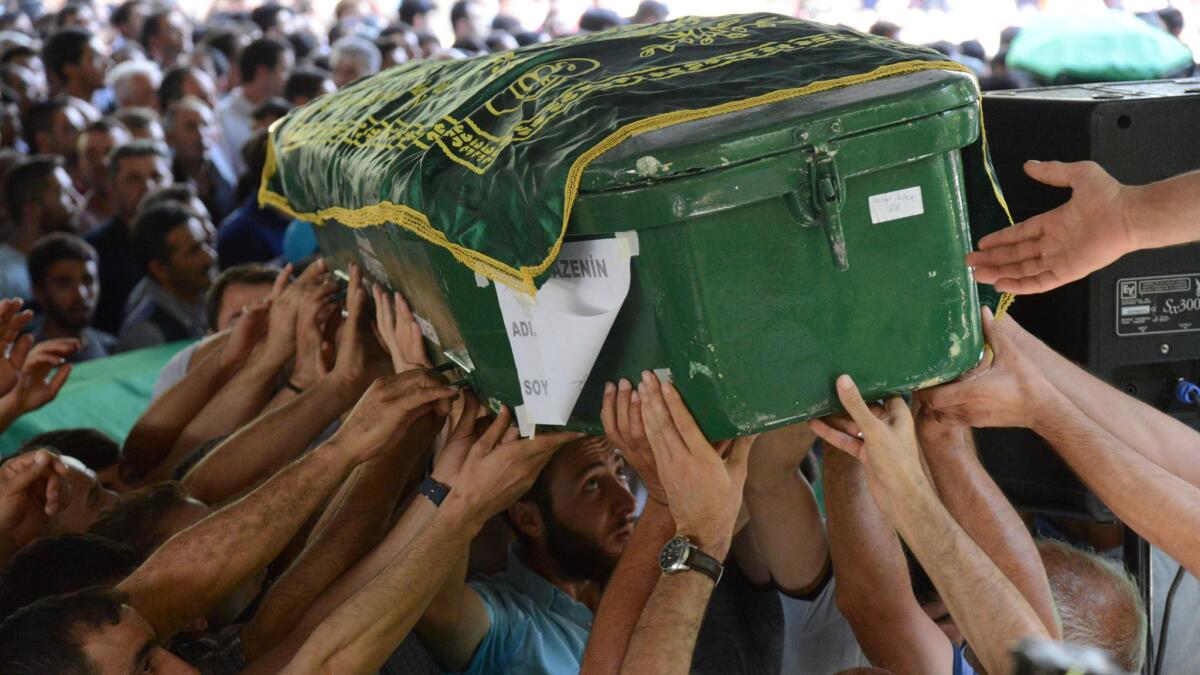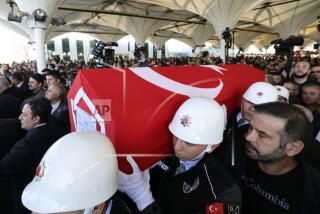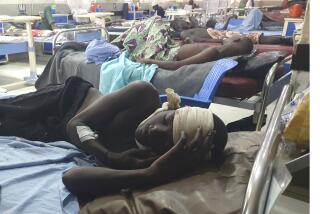Turkey’s president says wedding attacker who killed dozens was Islamic State bomber as young as 12
- Share via
Reporting from ISTANBUL, Turkey — As the death toll from a suicide bombing in southern Turkey rose to 51 on Sunday, authorities revealed a chilling detail: They believe it was carried out by Islamic State militants using a bomber as young as 12.
In addition to the dead, at least 69 people were injured in the bombing at a Kurdish wedding in the city of Gaziantep, about 25 miles north of the Syrian border, on Saturday night. Authorities said the bomber, who was mistaken for a guest, entered as the festivities were at their peak, with hundreds of people present.
The youngest victim was 3 years old.
“There are strong indications that the attack was carried out by Daesh,” Turkish President Recep Tayip Erdogan told reporters in Istanbul the morning after the bombing, using an Arabic acronym for Islamic State.
“A suicide bomber age 12 to 14 blew himself up,” he said. “We know that Daesh has been trying to gain ground in Gaziantep for a while now.”
He did not say what evidence pointed to Islamic State, and no group immediately claimed responsibility for the attack. Turkey is also battling a domestic insurgency from the Kurdistan Workers Party, better known as PKK, but the fact that this attack occurred at a Kurdish event largely removed any suspicion toward that group.

Turkish opposition parties condemned the bombing, as did a number of European and Arab governments. The White House issued a statement calling the attack “barbaric” and noted that Vice President Joe Biden would be visiting Ankara on Wednesday “to reaffirm our commitment to work together with Turkey, our valued NATO ally and partner, to confront the scourge of terrorism.”
Relations between the United States and Turkey have been strained in recent weeks by Turkey’s demand that the U.S. extradite Fethullah Gulen, a Turkish cleric living in Pennsylvania. Erdogan accuses Gulen of being behind a failed coup on July 15.
The Gaziantep prosecutor’s office said fragments of what were believed to have been the suicide vest were found and being examined.
Turkish authorities imposed a ban on graphic images of the bombing scene, a measure that has become routine over the last year.
Erdogan had earlier said the attack was probably aimed at sowing ethnic tensions in Turkey, adding that “the place where terror comes from doesn’t make any difference for us…. There is no difference between the PKK, the FETO or Daesh. All of them are terrorists.”
FETO is short for the Fetullahist Terror Organization, the government’s name for Gulen’s followers.
The pro-Kurdish People’s Democratic Party, or HDP, which has been the target of Islamic State attacks in the country that have killed hundreds since July 2015, issued a statement saying the bombing had targeted its party members, many of whom had traveled from nearby cities to attend the ceremony.
Saying it condemned “both the forces and ideology behind their actions,” the party noted that “it is quite significant” the attack coincided with a meeting of an umbrella group representing Kurdish groups calling for autonomy in Turkey, Syria and Iraq.
The meeting produced a resolution calling for a return to peace talks with the Turkish government. People’s Democratic Party co-chairman Selahattin Demirtas canceled a planned trip to South Africa to join other political leaders in Gaziantep after the bombing.
“Yesterday in Gaziantep, they targeted Kurds. It was a party member’s wedding. They seek to start a civil war,” Demirtas told reporters at the Gaziantep airport. “The best revenge for these barbarians would be to lead the country towards peace.”
In Istanbul on Saturday, hundreds attended protests near the central Taksim Square against the attack, some holding placards reading “the hand of peace is still outstretched.”
A cease-fire between the PKK and the government in Ankara collapsed in July 2015, and the rekindled insurgency as well as the Turkish military’s response in the Kurdish-majority southeast has killed more than 1,700 and displaced 350,000, according to a tally by the International Crisis Group.
Islamic State has battled Kurdish militias within Syria that work closely with the PKK for control of the Turkey-Syria border region. Islamic State members in Turkey, many of them ethnic Kurds, have carried out a number of deadly attacks on the People’s Democratic Party over the last year as well.
In June, suspected Islamic State members also carried out an attack at Istanbul’s main international airport, killing 44 people.
The Gaziantep attack is likely to further escalate tensions between the People’s Democratic Party and the ruling Justice and Development Party.
A delegation of politicians from the ruling party that attended the funeral of victims in Gaziantep on Sunday morning was met with crowds chanting “Murderer Erdogan!”
The People’s Democratic Party has been accused by Turkish officials of being too sympathetic to the PKK, and in the aftermath of last month’s coup attempt, the party has not been invited to meetings alongside other opposition lawmakers. Many of its parliament members could face criminal charges of support for the separatist rebel organization, which has been designated a terrorist group by Turkey as well as its Western allies.
In its statement on the bombing, the Kurdish party accused the government of failing to heed intelligence that such an attack was imminent in Gaziantep.
“On some indictments, it was revealed that the ones launching the attack on Oct. 10, 2015, in Ankara had also been planning to attack a Kurdish wedding,” it said. “However, the ruling party did not take the necessary steps to prevent these plans despite all the warnings.”
In May, Yunus Durmaz, a Turkish national believed to be among the planners of the Islamic State attack in October that left 103 people dead, was killed during a police raid on a safe house being used by the group in Gaziantep. Authorities found a warehouse in the city reportedly used by Durmaz and his associates to prepare explosives for attacks by Islamic State in Turkey, and a laptop that held plans for additional attacks targeting what Durmaz called “PKK supporters” who attend weddings.
Farooq is a special correspondent.
ALSO
Hearst Castle threatened by fast-moving Chimney Fire
California lawmakers expect another showdown on overtime pay for farmworkers
Did a U.S. think tank sponsor a military coup? Turkey thinks so.
UPDATES:
12:30 p.m.: Updated throughout with staff reporting and the new death toll.
5:50 a.m.: Updated with the bomber’s approximate age.
This article was first posted at 1:45 a.m.
More to Read
Sign up for Essential California
The most important California stories and recommendations in your inbox every morning.
You may occasionally receive promotional content from the Los Angeles Times.













